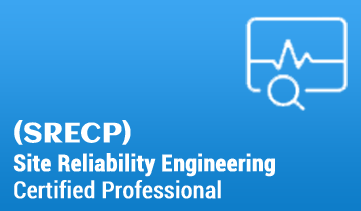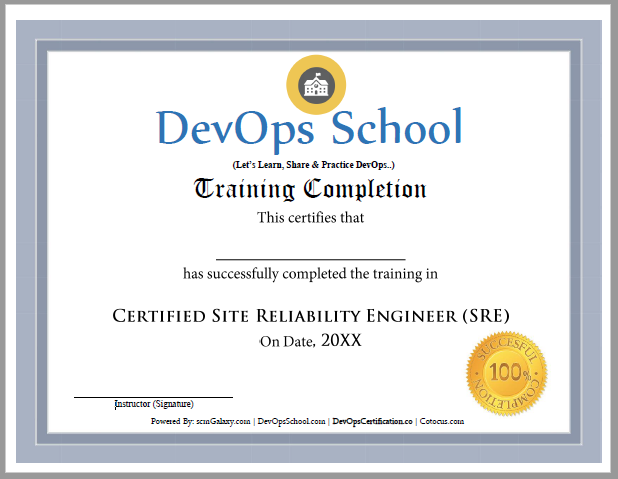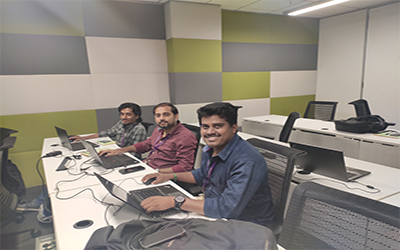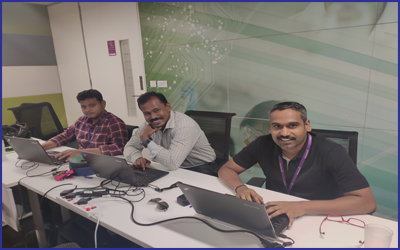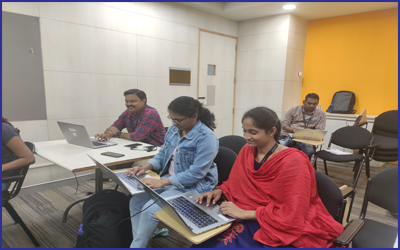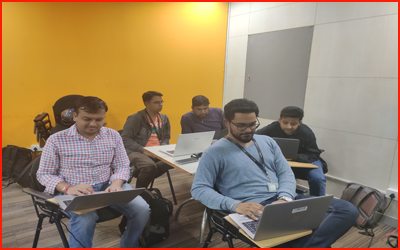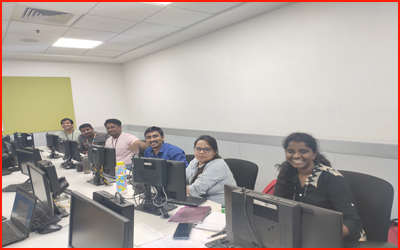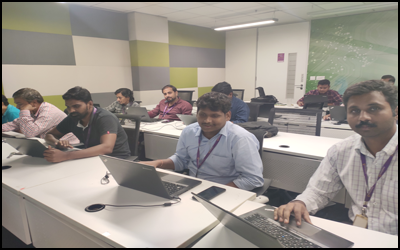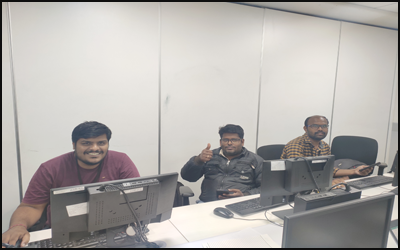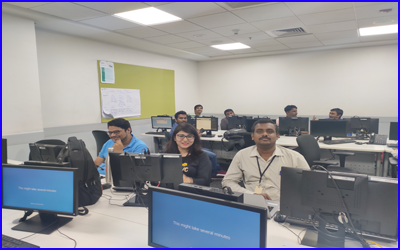Site Reliability Engineering (SRE) Certified Professional Training
Course Duration
72 hours/10 Days
Live Project
01
Certification
Industry recognized
Training Format
8000+
Certified Learners
15+
Years Avg. faculty experience
40+
Happy Clients
4.5/5.0
Average class rating
How DevOpsSchool will help in SRE Certification & Courses
The Site Reliability Engineering Certified Professional (SRECP) certification course by DevOpsSchool will help you to learn the principles & practices that allows an organization to reliably and economically scale critical services. SRE is a process of operations which emphasize to accumulate software engineering and automation solutions to ensure that continuously delivered applications are running efficiently and reliably. Our SRECP course highlights the progression of SRE in modern software engineering process and its future direction and prepares learners with the methods, practices, and tools to engage workforce across the organization involved in reliability and stability evidenced through the use of real-life scenarios and case stories.
Instructor-led, Live & Interactive Training
Duration |
Mode |
Level |
Batches |
Course Price at |
|---|---|---|---|---|
8 to 12 Hrs. (Approx) |
Online (Instructor-led) |
Advance |
Public batch |
49,999/- |
8 to 12 Hrs. (Approx) |
Videos (Self Learning) |
Advance |
Public batch |
14,999/- |
10 Days |
Corporate (Online/Classroom) |
Site Reliability Engineering (SRE)
|
Corporate Batch |
Contact US |
What is Site Reliability Engineering (SRE)?
Site Reliability Engineering (SRE) is a discipline that incorporates aspects of software engineering and applies them to infrastructure and operations problems. The main goals are to create scalable and highly reliable software systems. According to Ben Treynor, founder of Google's Site Reliability Team, SRE is "what happens when a software engineer is tasked with what used to be called operations."
Know about Site Reliability Engineering Certified Professional (SRECP)?
Site Reliability Engineering Certified Professional (SRECP) is a certification from DevOpsCertification.co. The Objective of this certification and its associated course is to impart, test and validate knowledge of SRE vocabulary, principles and practices. Site Reliability Engineering Certified Professional (SRECP) is intended to provide individuals an understanding of basic SRE concepts and how SRE may be used to improve operational activities by applying Site Reliability Engineering principles and engineering practices in Software Development Lifecycle.
This course teaches the theory of Service Level Objectives (SLOs), a principled way of describing and measuring the desired reliability of a service. Upon completion, Certified Professional should be able to apply these principles to develop the first SLOs for services they are familiar with in their own organizations.
Certified Professional will also learn how to use Service Level Indicators (SLIs) to quantify reliability and Error Budgets to drive business decisions around engineering for greater reliability. The learner will understand the components of a meaningful SLI and walk through the process of developing SLIs and SLOs for an example service.
What is Advantage of SRECP certification?
A Site Reliability Engineering Certified Professional (SRECP) Engineer is a professional who understands the principles of performance evaluation and prediction to improve product/systems safety, reliability and maintainability.
How to become Site Reliability Engineering Certified Professional?
Please contact contact@DevOpsSchool.com
What you would Learn?
You'll learn:
- How to run reliable services in environments you don't completely control-like cloud
- Practical applications of how to create, monitor, and run your services via service level objectives
- How to convert existing ops teams to SRE-including how to dig out of operational overload
- Methods for starting SRE from either greenfield or brownfield
Agenda of the Site Reliability Engineering Certified Professional?Download Curriculum
- Let’s Understand about Software Development Model
- Overview of Waterfall Development Model
- Challenges of Waterfall Development Model
- Overview of Agile Development Model
- Challenges of Agile Development Model
- Requirement of New Software Development Model
- Understanding an existing Pain and Waste in Current Software Development Model
- What is DevOps?
- Transition in Software development model
- Waterfall -> Agile -> CI/CD -> DevOps -> DevSecOps
- Understand DevOps values and principles
- Culture and organizational considerations
- Communication and collaboration practices
- Improve your effectiveness and productivity
- DevOps Automation practices and technology considerations
- DevOps Adoption considerations in an enterprise environment
- Challenges, risks and critical success factors
- What is DevSecOps?
- Let’s Understand DevSecOps Practices and Toolsets.
- What is SRE?
- Let’s Understand SRE Practices and Toolsets.
- List of Tools to become Full Stack Developer/QA/SRE/DevOps/DevSecOps
- Microservices Fundamentals
- Microservices Patterns
- Choreographing Services
- Presentation components
- Business Logic
- Database access logic
- Application Integration
- Modelling Microservices
- Integrating multiple Microservices
- Keeping it simple
- Avoiding Breaking Changes
- Choosing the right protocols
- Sync & Async
- Dealing with legacy systems
- Testing
- What and When to test
- Preparing for deployment
- Monitoring Microservice Performance
- Tools used for Microservices Demo using container
Ubuntu
- Installing CentOS7 and Ubuntu
- Accessing Servers with SSH
- Working at the Command Line
- Reading Files
- Using the vi Text Editor
- Piping and Redirection
- Archiving Files
- Accessing Command Line Help
- Understanding File Permissions
- Accessing the Root Account
- Using Screen and Script
- Overview of Hypervisor
- Introduction of VirtualBox
- Install VirtualBox and Creating CentOS7 and Ubuntu Vms
Vagrant
- Understanding Vagrant
- Basic Vagrant Workflow
- Advance Vagrant Workflow
- Working with Vagrant VMs
- The Vagrantfile
- Installing Nginx
- Provisioning
- Networking
- Sharing and Versioning Web Site Files
- Vagrant Share
- Vagrant Status
- Sharing and Versioning Nginx Config Files
- Configuring Synced Folders
- Introduction of AWS
- Understanding AWS infrastructure
- Understanding AWS Free Tier
- IAM: Understanding IAM Concepts
- IAM: A Walkthrough IAM
- IAM: Demo & Lab
- Computing:EC2: Understanding EC2 Concepts
- Computing:EC2: A Walkthrough EC2
- Computing:EC2: Demo & Lab
- Storage:EBS: Understanding EBS Concepts
- Storage:EBS: A Walkthrough EBS
- Storage:EBS: Demo & Lab
- Storage:S3: Understanding S3 Concepts
- Storage:S3: A Walkthrough S3
- Storage:S3: Demo & Lab
- Storage:EFS: Understanding EFS Concepts
- Storage:EFS: A Walkthrough EFS
- Storage:EFS: Demo & Lab
- Database:RDS: Understanding RDS MySql Concepts
- Database:RDS: A Walkthrough RDS MySql
- Database:RDS: Demo & Lab
- ELB: Elastic Load Balancer Concepts
- ELB: Elastic Load Balancer Implementation
- ELB: Elastic Load Balancer: Demo & Lab
- Networking:VPC: Understanding VPC Concepts
- Networking:VPC: Understanding VPC components
- Networking:VPC: Demo & Lab
- What is Containerization?
- Why Containerization?
- How Docker is good fit for Containerization?
- How Docker works?
- Docker Architecture
- Docker Installations & Configurations
- Docker Components
- Docker Engine
- Docker Image
- Docker Containers
- Docker Registry
- Docker Basic Workflow
- Managing Docker Containers
- Creating our First Image
- Understading Docker Images
- Creating Images using Dockerfile
- Managing Docker Images
- Using Docker Hub registry
- Docker Networking
- Docker Volumes
- Deepdive into Docker Images
- Deepdive into Dockerfile
- Deepdive into Docker Containers
- Deepdive into Docker Networks
- Deepdive into Docker Volumes
- Deepdive into Docker Volume
- Deepdive into Docker CPU and RAM allocations
- Deepdive into Docker Config
- Docker Compose Overview
- Install & Configure Compose
- Understanding Docker Compose Workflow
- Understanding Docker Compose Services
- Writing Docker Compose Yaml file
- Using Docker Compose Commands
- Docker Compose with Java Stake
- Docker Compose with Rails Stake
- Docker Compose with PHP Stake
- Docker Compose with Nodejs Stake
- Overview of Jira
- Use cases of Jira
- Architecture of Jira
- Installation and Configuraration of Jira in Linux
- Installation and Configuraration of Jira in Windows
- Jira Terminologies
- Understanding Types of Jira Projects
- Working with Projects
- Working with Jira Issues
- Adding Project Components and Versions
- Use Subtasks to Better Manage and Structure Your Issues
- Link Issues to Other Resources
- Working in an Agile project
- Working with Issues Types by Adding/Editing/Deleting
- Working with Custom Fields by Adding/Editing/Deleting
- Working with Screens by Adding/Editing/Deleting
- Searching and Filtering Issues
- Working with Workflow basic
- Introduction of Jira Plugins and Addons.
- Jira Integration with Github
- Exploring Confluence benefits and resources
- Configuring Confluence
- Navigating the dashboard, spaces, and pages
- Creating users and groups
- Creating pages from templates and blueprints
- Importing, updating, and removing content
- Giving content feedback
- Watching pages, spaces, and blogs
- Managing tasks and notifications
- Backing up and restoring a site
- Admin tasks
- Add/Edit/Delete new users
- Adding group and setting permissions
- Managing user permissions
- Managing addons or plugins
- Customizing confluence site
- Installing Confluence
- Evaluation options for Confluence
- Supported platforms
- Installing Confluence on Windows
- Activating Confluence trial license
- Finalizing Confluence Installation
- Introduction of Git
- Installing Git
- Configuring Git
- Git Concepts and Architecture
- How Git works?
- The Git workflow
- Working with Files in Git
- Adding files
- Editing files
- Viewing changes with diff
- Viewing only staged changes
- Deleting files
- Moving and renaming files
- Making Changes to Files
- Undoing Changes
- - Reset
- - Revert
- Amending commits
- Ignoring Files
- Branching and Merging using Git
- Working with Conflict Resolution
- Comparing commits, branches and workspace
- Working with Remote Git repo using Github
- Push - Pull - Fetch using Github
- Tagging with Git
Apache HTTP
- Introduction to web server
- Install Apache on CentOS 7.4
- Enable Apache to automatically start when system boot
- Configure the firewall service
- Where is Apache?
- Directory structure
- Apache directory structure
- Configuration file
- Create your first page
- Virtual hosts
- Setting up the virtual host - name based
- Setting up the virtual host - port based
- Using aliases and redirecting
- Configuring an alias for a url
- Redirects
- Logging
- The error log
- The access log
- Custom log
- Log rotation
- Security
- Basic Security - Part 1
- Basic Security - Part 2
- Set up TLS/SSl for free
- Basic authentication
- Digest authentication
- Access Control
- .htaccess (Administrator Side)
- .htaccess (User Side)
- Install and Configure antivirus
- Mitigate dos attacks - mod_evasive
- Apache Performance and Troubleshooting
- Apache Multi-Processing Modules (MPMs)
- Adjusting httpd.conf - Part 1
- Adjusting httpd.conf - Part 2
- Troubleshoot Apache (Analyz Access Log) - Part 1
- Troubleshoot Apache (Analyze Access Log) - Part 2
- Use Apachetop to monitor web server traffic
Nginx
- Overview
- Introduction
- About NGINX
- NGINX vs Apache
- Test your knowledge
- Installation
- Server Overview
- Installing with a Package Manager
- Building Nginx from Source & Adding Modules
- Adding an NGINX Service
- Nginx for Windows
- Test your knowledge
- Configuration
- Understanding Configuration Terms
- Creating a Virtual Host
- Location blocks
- Variables
- Rewrites & Redirects
- Try Files & Named Locations
- Logging
- Inheritance & Directive types
- PHP Processing
- Worker Processes
- Buffers & Timeouts
- Adding Dynamic Modules
- Test your knowledge
- Performance
- Headers & Expires
- Compressed Responses with gzip
- FastCGI Cache
- HTTP2
- Server Push
- Security
- HTTPS (SSL)
- Rate Limiting
- Basic Auth
- Hardening Nginx
- Test your knowledge
- Let's Encrypt - SSL Certificates
- Overflow of Configuration Management
- Introduction of Ansible
- Ansible Architecture
- Let’s get startted with Ansible
- Ansible Authentication & Authorization
- Let’s start with Ansible Adhoc commands
- Let’s write Ansible Inventory
- Let’s write Ansible Playbook
- Working with Popular Modules in Ansible
- Deep Dive into Ansible Playbooks
- Working with Ansible Variables
- Working with Ansible Template
- Working with Ansible Handlers
- Roles in Ansible
- Ansible Galaxy
- Understanding the Need of Kubernetes
- Understanding Kubernetes Architecture
- Understanding Kubernetes Concepts
- Kubernetes and Microservices
- Understanding Kubernetes Masters and its Component
- kube-apiserver
- etcd
- kube-scheduler
- kube-controller-manager
- Understanding Kubernetes Nodes and its Component
- kubelet
- kube-proxy
- Container Runtime
- Understanding Kubernetes Addons
- DNS
- Web UI (Dashboard)
- Container Resource Monitoring
- Cluster-level Logging
- Understand Kubernetes Terminology
- Kubernetes Pod Overview
- Kubernetes Replication Controller Overview
- Kubernetes Deployment Overview
- Kubernetes Service Overview
- Understanding Kubernetes running environment options
- Working with first Pods
- Working with first Replication Controller
- Working with first Deployment
- Working with first Services
- Introducing Helm
- Basic working with Helm
- Deploying Your First Terraform Configuration
- Introduction
- What's the Scenario?
- Terraform Components
- Updating Your Configuration with More Resources
- Introduction
- Terraform State and Update
- What's the Scenario?
- Data Type and Security Groups
- Configuring Resources After Creation
- Introduction
- What's the Scenario?
- Terraform Provisioners
- Terraform Syntax
- Adding a New Provider to Your Configuration
- Introduction
- What's the Scenario?
- Terraform Providers
- Terraform Functions
- Intro and Variable
- Resource Creation
- Deployment and Terraform Console
- Updated Deployment and Terraform Commands
Envoy
- What is Envoy
- Architecture overview
- Life of a Request
- Deployment types
- Getting help
- Getting Started
- Quick Start to Run Simple Example
- Simple Configuration
- Using the Envoy Docker Image
- Sandboxes
- Other use cases
- Building and installation
- Building
- Reference configurations
- Tools
Istio
- Managing Service Traffic
- o Understanding VirtualServices, DestinationRules, and Subsets
- o A Dark Launch for a New Feature
- o Using Gateways with VirtualServices to Mange External Traffic
- o A Blue/Green Deployment
- o Configuring Canary Deployments with Traffic Weighting
- o Canary Deployments with and without Cookies
- o Managing Traffic for Application Health with a Circuit Breaker
- o Circuit Breaker with Outlier Detection
- Securing Communication with Mutual TLS
- o Understanding Mutual TLS and Istio Policies
- o Securing Services with Mutual TLS
- o Using AuthorizationPolicy to Secure Access to Services
- o Service Authorization with mTLS
- o Applying Policies to Secure End-user Access
- o End-user Authorization with JWT
- Observing the Service Network
- o Understanding the Telemetry Flow through Istio
- o Visualizing the Service Mesh
- o Dashboards for Services and Istio
- o Capturing OpenTelemetry Headers for Distributed Tracing
- o Distributed Tracing
- o Integrating Istio with Your Logging Stack
- o Logging with Fluentd and Kibana
- Running Istio in Production
- o Considerations for Deploying Istio in Production
- o Configuring and Deploying Istio in Production
- o Deploying BookInfo to Production
- o Migrating Live Applications to Istio
- o Migrating to Istio with mTLS, Authorization and Ingress
- o Understanding Potential Failure Scenarios
- o Do You Need a Service Mesh?
- Why Consul?
- Modern Ops Challenges
- An Explosion of Services
- First Class Service Discovery
- Distributed Failure Detection
- Reactive Configuration via Key/Value Store
- Multi Datacenter Aware
- Monitoring Nodes
- Nodes and Services
- What We Will Set Up
- Defining the consul-server Node
- Launching the consul-server Node
- Network Interfaces on consul-server
- Exercise Consul Is Easy to Install
- Installing Consul
- Running the Consul Dev Agent
- Running Consul Locally to Access the Web UI
- Interface Web UI
- Interface HTTP API
- Interface DNS
- Interface CLI RPC
- Client vs. Cluster Address Conventions
- Challenge Spin Up Web and LB nodes
- Defining Web and LB Nodes
- Running Web and LB Nodes
- nsul Agent On Web and LB nodes
- Remote Command Execution Across Cluster
- Graceful Leave vs. Failure
- Service Discovery
- From Nodes to Services
- Registering a Web Service
- Service Definitions
- Health Checking the Web Service
- Launching NGINX
- Consul DNS for Randomized Internal Service Load Balancing
- HTTP API and Failing Services
- Exercise Register Load Balancer
- Maintenance Mode
- Registration Methods
- Dynamic LB Config with consul-template
- HAProxy
- Setup Script for HAProxy
- Static HAProxy Config
- Handling Failed Services
- HAProxy Config Template
- What Is Consul Template?
- Installing Consul Template
- Consul Template Dry Mode
- Dynamically Regenerate HAProxy Config
- Rolling Updates with Maintenance Mode
- Other Tools Like Consul Template
- Benefits Recap and What Next
- Reactive Configuration via Key/Value Store Why?
- Creating Keys and Folders in the Web UI
- Key Value CRUD via the CLI
- Exercise Get KV Data into HAProxy
- Reactive, Real Time Configuration Files
- Revolutionizing Configuration Management
- Blocking Queries
- Tools to Investigate
- Health Checking
- Intro
- Terms Agent, Client, and Server Mode
- Gossip and Edge Triggered Updates
- Understanding Serf Health Status
- Node and Service Level Check Definitions
- Custom Node Level Health Checks of Disk, Memory, and CPU
- Self Healing Nodes
- Health Checking Is the Value at the Last Transition
- Health Check Recap
- Don't Forget to Try This Out
- Consul Docs Overview
- Lets understand Continuous Integration
- What is Continuous Integration
- Benefits of Continuous Integration
- What is Continuous Delivery
- What is Continuous Deployment
- Continuous Integration Tools
- What is Jenkins
- History of Jenkins
- Jenkins Architecture
- Jenkins Vs Jenkins Enterprise
- Jenkins Installation and Configurations
- Jenkins Dashboard Tour
- Understand Freestyle Project
- Freestyle General Tab
- Freestyle Source Code Management Tab
- Freestyle Build Triggers Tab
- Freestyle Build Environment
- Freestyle Build
- Freestyle Post-build Actions
- Manage Jenkins
- My Views
- Credentials
- People
- Build History
- Creating a Simple Job
- Simple Java and Maven Based Application
- Simple Java and Gradle Based Application
- Simple DOTNET and MSBuild Based Application
- Jobs Scheduling in Jenkins
- Manually Building
- Build Trigger based on fixed schedule
- Build Trigger by script
- Build Trigger Based on pushed to git
- Useful Jobs Configuration
- Jenkins Jobs parameterised
- Execute concurrent builds
- Jobs Executors
- Build Other Projects
- Build after other projects are built
- Throttle Builds
- Jenkins Plugins
- Installing a Plugin
- Plugin Configuration
- Updating a Plugin
- Plugin Wiki
- Top 20 Useful Jenkins Plugins
- Using Jenkins Pluginss Best Practices
- Jenkins Node Managment
- Adding a Linux Node
- Adding a Windows Nodes
- Nodes Management using Jenkins
- Jenkins Nodes High Availability
- Jenkins Integration with other tools
- Jira
- Git
- SonarQube
- Maven
- Junit
- Ansible
- Docker
- AWS
- Jacoco
- Coverity
- Selenium
- Gradle
- Reports in Jenkins
- Junit Report
- SonarQube Reports
- Jacoco Reports
- Coverity Reports
- Selenium Reports
- Test Results
- Cucumber Reports
- Jenkins Node Managment
- Adding a Linux Node
- Adding a Windows Nodes
- Nodes Management using Jenkins
- Jenkins Nodes High Availability
- Notification & Feedback in Jenkins
- CI Build Pipeline & Dashboard
- Email Notification
- Advance Email Notification
- Slack Notification
- Jenkins Advance - Administrator
- Security in Jenkins
- Authorization in Jenkins
- Authentication in Jenkins
- Managing folder/subfolder
- Jenkins Upgrade
- Jenkins Backup
- Jenkins Restore
- Jenkins Command Line
- Introduction
- Vault Concepts and Use Cases
- Vault Comparison
- Installing Vault
- Installing Vault Demo
- Starting a Dev Server
- Basic Secret Management
- Managing Secrets Demo
- Working with Secrets
- Introduction
- Key Value Secrets Engines
- Key Value Secrets Lifecycle Demo
- Scenario and General Secrets Engines
- Working with Secrets Engines
- Key Value Secrets Engine Demo
- Database Secrets Engine
- MySQL Secrets Engine Demo
- Dynamic Secrets
- Dynamic Secrets Demo
- Auditing Actions in Vault
- Audit Architecture and Device Types
- Vault Audit Commands
- Vault Audit Scenario
- Vault Enabling Auditing
- Vault Audit Log Review
- Vault Reviewing Audit Logs
- Operating Vault Server
- Overview
- Vault Server Architecture
- Storage Backend Options
- Installation Scenario
- Setting up the Consul Server
- Installing the Consul Agent
- Vault Server Configuration
- Installing Vault Server
- Server Operations
- Unseal and Initialize Vault Server
- Rotating and Updating Keys
- Managing Root Token
- Controlling Access in Vault
- Overview
- Authentication Methods
- Enabling the Userpass Method
- Logging in with Userpass
- Active Directory Authentication
- Vault Policies
- Creating Policies
- Configuring LDAP Authentication
- Client Tokens
- Response Wrapping
- Using Response Wrapping
- SSL & Certificates
- How SSL works
- Types of SSL
- Demo with OpenSSL
- How Certificates based auth works!
- Getting started
- Integrations
- Infrastructure
- Host Map
- Events
- Dashboards
- Datadog Tagging
- Assigning Tags
- Using Tags
- Agent
- Datadog Agent Usage
- Datadog Agent Docker
- Datadog Agent Kubernetes
- Datadog Agent Cluster Agent
- Datadog Agent Log Collection
- Datadog Agent Proxy
- Datadog Agent Versions
- Datadog Agent Troubleshooting
- Datadog Integrations
- Apache
- Tomcat
- AWS
- MySql
- Datadog Metrics
- Metrics Introduction
- Metrics Explorer
- Metrics Summary
- Datadog Graphing
- Dashboards
- Metrics
- Datadog Alerting
- Monitors
- Manage Monitors
- Monitor Status
Prometheus
- Introduction
- Introduction to Prometheus
- Prometheus installation
- Grafana with Prometheus Installation
- Monitoring
- Introduction to Monitoring
- Client Libraries
- Pushing Metrics
- Querying
- Service Discovery
- Exporters
- Alerting
- Introduction to Alerting
- Setting up Alerts
- Internals
- Prometheus Storage
- Prometheus Security
- TLS & Authentication on Prometheus Server
- Mutual TLS for Prometheus Targets
- Use Cases
- Monitoring a web application
- Calculating Apdex score
- Cloudwatch Exporter
- Grafana Provisioning
- Consul Integration with Prometheus
- EC2 Auto Discovery
Grafana
- Installation
- Installing on Ubuntu / Debian
- Installing on Centos / Redhat
- Installing on Windows
- Installing on Mac
- Installing using Docker
- Building from source
- Upgrading
- Administration
- Configuration
- Authentication
- Permissions
- Grafana CLI
- Internal metrics
- Provisioning
- Troubleshooting
- What Is Splunk?
- Overview
- Machine Data
- Splunk Architecture
- Careers in Splunk
- Setting up the Splunk Environment
- Overview
- Splunk Licensing
- Getting Splunk
- Installing Splunk
- Adding Data to Splunk
- Basic Searching Techniques
- Adding More Data
- Search in Splunk
- Demo: Splunk Search
- Splunk Search Commands
- Splunk Processing Langauge
- Splunk Reports
- Reporting in Splunk
- Splunk Alerts
- Alerts in Splunk
- Enterprise Splunk Architecture
- Overview
- Forwarders
- Enterprise Splunk Architecture
- Installing Forwarders
- Installing Forwarders
- Troubleshooting Forwarder Installation
- Splunking for DevOps and Security
- Splunk in DevOps
- DevOps Demo
- Splunk in Security
- Enterprise Use Cases
- Application Development in Splunkbase
- What Is Splunkbase?
- Navigating the Splunkbase
- Creating Apps for Splunk
- Benefits of Building in Splunkbase
- Splunking on Hadoop with Hunk
- What Is Hadoop?
- Running HDFS Commands
- What Is Hunk?
- Installing Hunk
- Moving Data from HDFS to Hunk
- Composing Advanced Searches
- Splunk Searching
- Introduction to Advanced Searching
- Eval and Fillnull Commands
- Other Splunk Command Usage
- Filter Those Results!
- The Search Job Inspector
- Creating Search Macros
- What Are Search Macros?
- Using Search Macros within Splunk
- Macro Command Options and Arguments
- Other Advanced Searching within Splunk
- Introduction to Elasticsearch
- Overview of the Elastic Stack (ELK+)
- Elastic Stack
- Architecture of Elasticsearch
- Nodes & Clusters
- Indices & Documents
- A word on types
- Another word on types
- Sharding
- Replication
- Keeping replicas synchronized
- Searching for data
- Distributing documents across shards
- Installing Elasticsearch & Kibana
- Running Elasticsearch & Kibana in Elastic Cloud
- Installing Elasticsearch on Mac/Linux
- Using the MSI installer on Windows
- Installing Elasticsearch on Windows
- Configuring Elasticsearch
- Installing Kibana on Mac/Linux
- Installing Kibana on Windows
- Configuring Kibana
- Kibana now requires data to be available
- Introduction to Kibana and dev tools
- Managing Documents
- Creating an index
- Adding documents
- Retrieving documents by ID
- Replacing documents
- Updating documents
- Scripted updates
- Upserts
- Deleting documents
- Deleting indices
- Batch processing
- Importing test data with cURL
- Exploring the cluster
- Mapping
- Introduction to mapping
- Dynamic mapping
- Meta fields
- Field data types
- Adding mappings to existing indices
- Changing existing mappings
- Mapping parameters
- Adding multi-fields mappings
- Defining custom date formats
- Picking up new fields without dynamic mapping
- Analysis & Analyzers
- Introduction to the analysis process
- A closer look at analyzers
- Using the Analyze API
- Understanding the inverted index
- Analyzers
- Overview of character filters
- Overview of tokenizers
- Overview of token filters
- Overview of built-in analyzers
- Configuring built-in analyzers and token filters
- Creating custom analyzers
- Using analyzers in mappings
- Adding analyzers to existing indices
- A word on stop words
- Introduction to Searching
- Search methods
- Searching with the request URI
- Introducing the Query DSL
- Understanding query results
- Understanding relevance scores
- Debugging unexpected search results
- Query contexts
- Full text queries vs term level queries
- Basics of searching
- Term Level Queries
- Introduction to term level queries
- Searching for a term
- Searching for multiple terms
- Retrieving documents based on IDs
- Matching documents with range values
- Working with relative dates (date math)
- Matching documents with non-null values
- Matching based on prefixes
- Searching with wildcards
- Searching with regular expressions
- Term Level Queries
- Full Text Queries
- Introduction to full text queries
- Flexible matching with the match query
- Matching phrases
- Searching multiple fields
- Full Text Queries
- Adding Boolean Logic to Queries
- Introduction to compound queries
- Querying with boolean logic
- Debugging bool queries with named queries
- How the “match” query works
- Introduction and Overview of NewRelic
- What is Application Performance Management?
- Understanding a need of APM
- Understanding transaction traces
- What is Application Performance?
- APM Benefits
- APM Selection Criteria
- Why NewRelic is best for APM?
- What is NewRelic APM?
- How does NewRelic APM work?
- NewRelic Architecture
- NewRelic Terminology
- Installing and Configuring NewRelic APM Agents for Application
- Register a Newrelic Trial account
- Installing a JAVA Agent to Monitor your Java Application
- Installing a PHP Agent to Monitor your PHP Application
- Installing New Relic Agent for .NET Framework Application
- Installing a Docker based Agent to Monitor your Docker based Application
- Understanding of NewRelic Configration settings of newrelic.yml
- Understanding of NewRelic Agent Configration settings
- Working with NewRelic Dashboard
- Understanding a transactions
- Understanding Apdex and Calculating and Setting Apdex Threshold
- Understanding Circuit break
- Understanding Throughput
- Newrelic default graphs
- Understanding and Configuring Service Maps
- Understanding and Configuring JVM
- Understanding Error Analytics
- Understanding Violations
- Understanding and Configuring Deployments
- Understanding and Configuring Thread Profiler
- Depp Dive into Transaction Traces
- Profiling with New Relic
- Creating and managing Alerts
- Working with Incidents
- Sending NewRelic Alerts to Slack
- Assessing the quality of application deployments
- Monitoring using Newrelic
- View your applications index
- APM Overview page
- New Relic APM data in Infrastructure
- Transactions page
- Databases and slow queries
- Viewing slow query details
- External services page
- Agent-specific UI
- Viewing the transaction map
- Deep Dive into Newrelic Advance
- Newrelic transaction alerts
- Configure abnd Troubleshoot and Cross Application Traces
- NewRelic Service Level Agreements
- Troubleshooting NewRelic
- Understanding and Configuring NewRelic X-Ray Sessions
- Deep Dive into NewRelic Agent Configuration
- Adding Custom Data with the APM Agent
- Extending Newrelic using Plugins
- Finding and Fixing Application Performance Issues with New Relic APM
- Setting up database montioring using Newrelic APM
- Setting up and Configuring Newrelic Alerts
- Working with NewRelic Performance Reports
- Availability report
- Background jobs analysis report
- Capacity analysis report
- Database analysis report
- Host usage report
- Scalability analysis report
- Web transactions analysis report
- Weekly performance report
- Videos Only
Conclusion
The attributes of SRE
“There are a lot of attributes SRE would share with any engineering discipline: pragmatic, objective, articulate, expressive,” says Theo Schlossnagle, founder of Circonus. “However, one that sets itself apart is a desire to straddle layers of abstraction.”
“The basic tenet of SRE is that doing operations well is a software problem. SRE should therefore use software engineering approaches to solve that problem.”
Maintaining 100% availability isn’t the goal of SRE. “Instead, the product team and the SRE team select an appropriate availability target for the service and its user base, and the service is managed to that SLO. Deciding on such a target requires strong collaboration from the business.”
— Toil is tedious, manual, work. SRE doesn’t accept toil as the default. “We believe that if a machine can perform a desired operation, then a machine often should. This is a distinction (and a value) not often seen in other organizations, where toil is the job, and that’s what you’re paying a person to do.”
Automation goes hand-in-hand with reducing toil by “determining what to automate, under what conditions, and how to automate it.”
The later a problem is discovered, the harder it is to fix. SRE addresses this issue. “SREs are specifically charged with improving undesirably late problem discovery, yielding benefits for the company as a whole.”
SRE aims to reduce boundaries. “Ideally, both product development and SRE teams should have a holistic view of the stack—the frontend, backend, libraries, storage, kernels, and physical machine—and no team should jealously own single components.”
In SRE, you can’t have different teams using different sets of tools. “There is no good way to manage a service that has one tool for the SREs and another for the product developers, behaving differently (and potentially catastrophically so) in different situations. The more divergence you have, the less your company benefits from each effort to improve each individual tool.”
INTERVIEW
As part of this, You would be given complete interview preparations kit, set to be ready for the SRE hotseat. This kit has been crafted by 200+ years industry experience and the experiences of nearly 10000 DevOpsSchool SRE learners worldwide.
PROJECTS
To put your knowledge on into action, you will be required to work on 1 real time scenario industry-based projects that discuss significant real-time use cases. This project will be completely in-line with the modules mentioned in the curriculum and help you to understand real-work environment.
OUR COURSE IN COMPARISON
| FEATURES | DEVOPSSCHOOL | OTHERS |
|---|---|---|
| Faculty Profile Check | ||
| Lifetime Technical Support | ||
| Lifetime LMS access | ||
| Top 26 Tools | ||
| Training + Additional Videos | ||
| Real time scenario projects | ||
| Interview KIT (Q&A) | ||
| Training Notes | ||
| Step by Step Web Based Tutorials | ||
| Training Slides |
This is the ERA of IT and the whole world has switched to online. Whether shops, banks, service industries or any other businesses and its really crucial to have services up and running as quickly as possible and we must try to prevent any subsequent failure for as long as possible.
If we'll see various services like: GMAIL, Google, Walmart, Netflix, Facebook, Twitter or various e-commerce operations to global banks to search engines they have been running like without any failure for a much longer period of time. We don't even remember when the last time their operations was down. According to Gartner, the average cost of downtime is going somewhere around $5,600 per minute to—when it comes to Amazon —$2 million for every minute down. The way we manage systems and their workloads has changed. How its possible to continuouly running all these services with hell lots of requests, clicks, coninuous changes and improvment and uses 24X7 - 365 days. Behind the scenes, there are principles of "Site Reliability Engineering (SRE)" that takes place.
Reliability of websites, cloud applications and cloud infrastructure has turn into an important business needs. These days we hardly think about high-performance servers instead of that we are using cloud services from where we can pool commodity servers through virtualization. The focus has shifted from hardware to software-defined infrastructure and from inconsistent and error-prone manual processes to consistent, reliable, and repeatable automated tasks. A Site Reliability Engineer (SRE) is some one who can take care and be accountable for the availability, performance, monitoring, and incident response, among other things, of the platforms and services that our businesses runs and owns.
The SRE methodolgy and priciples establishes a healthy and productive interaction between the development and SRE teams using SLOs and error budgets to balance the speed of new features with whatever work is needed to make the software reliable. They care about every step and process from source code to deployment. SRE therefore required quite special expertise and various tools in their arsenal to succeed, along with strong trust between teams.
- The goal of our SRE course is to make you a Certifed SRE Engineer from a normal software engineer or operation engineer. Our currciculum will help you to learn all the skills you need to develop, the mindset shift that needs to take place, and the practical work experience you should pursue before directly getting into a SRE role.
- Our SRE training will help you to walk through all the concepts, principles and approach to service management, and help you to gain an understanding of the basics to advanced topics of site reliability engineering. You'll get all the real-world examples and use cases of how companies are using SRE approach to ensure that their services are exactly as reliable as they need to be. And what technical and professional skills an SRE needs to embed themselves within development teams with culture and human aspects of makes up a good SRE team that drives successful implementation.
- Our SRE curriculum and certification are acrredited from DevOpsCertification.co.
- The SRE training will be delivered by accredited trainers who are highly experienced professionals with 15+ years of industry experience and have trained more than 5000 professionals.
- There are no as such specific pre-requisites but IT experience/Operations experience/DevOps knowledge is recommended
UPCOMING EVENTS - OTHER CERTIFICATION COURSES
January 2021
January 2021
January 2021
January 2021
January 2021
January 2021
Site Reliability Engineering Certified Professional (SRECP) Certification
What are the benefits of Site Reliability Engineering (SRE) certification?
- SREs are now hired commonly by modern software teams to assure their software is reliable for their customers.
- Companies are already started to implementing SRE, which means it will continue to be adopted.
- Certified SRE Engineers are among the highest paid JOB in the tech industry
- If we believe on various reports, Certified SREs are among the most wanted in the tech industry and 33% of recruiters said they are having a hard time hiring professionals with these skills.
- The average salary of a Certified SRE engineer:
-Gloablly (Median salary) - $117,264
-India (Median Salary) - ₹12,00,000
(Note: Depends on the experience and employer as well)
- SRE as a career, experts and leaders agree will stay in-demand
View more
FREQUENTLY ASKED QUESTIONS
To maintain the quality of our live sessions, we allow limited number of participants. Therefore, unfortunately live session demo cannot be possible without enrollment confirmation. But if you want to get familiar with our training methodology and process or trainer's teaching style, you can request a pre recorded Training videos before attending a live class.
Yes, after the training completion, participant will get one real-time scenario based project where they can impletement all their learnings and acquire real-world industry setup, skills, and practical knowledge which will help them to become industry-ready.
All our trainers, instructors and faculty members are highly qualified professionals from the Industry and have at least 10-15 yrs of relevant experience in various domains like IT, Agile, SCM, B&R, DevOps Training, Consulting and mentoring. All of them has gone through our selection process which includes profile screening, technical evaluation, and a training demo before they onboard to led our sessions.
No. But we help you to get prepared for the interviews and resume preparation as well. As there is a big demand for DevOps professionals, we help our participants to get ready for it by working on a real life projects and providing notifications through our "JOB updates" page and "Forum updates" where we update JOB requirements which we receive through emails/calls from different-different companies who are looking to hire trained professionals.
The system requirements include Windows / Mac / Linux PC, Minimum 2GB RAM and 20 GB HDD Storage with Windows/CentOS/Redhat/Ubuntu/Fedora.
All the Demo/Hands-on are to be executed by our trainers on DevOpsSchool's AWS cloud. We will provide you the step-wise guide to set up the LAB which will be used for doing the hands-on exercises, assignments, etc. Participants can practice by setting up the instances in AWS FREE tier account or they can use Virtual Machines (VMs) for practicals.
- Google Pay/Phone pe/Paytm
- NEFT or IMPS from all leading Banks
- Debit card/Credit card
- Xoom and Paypal (For USD Payments)
- Through our website payment gateway
Please email to contact@DevopsSchool.com
You will never lose any lecture at DevOpsSchool. There are two options available: You can view the class presentation, notes and class recordings that are available for online viewing 24x7 through our Learning management system (LMS). You can attend the missed session, in any other live batch or in the next batch within 3 months. Please note that, access to the learning materials (including class recordings, presentations, notes, step-bystep-guide etc.)will be available to our participants for lifetime.
Yes, Classroom training is available in Bangalore, Hyderabad, Chennai and Delhi location. Apart from these cities classroom session can be possible if the number of participants are 6 plus in that specific city.
Location of the training depends on the cities. You can refer this page for locations:- Contact
We use GoToMeeting platform to conduct our virtual sessions.
DevOpsSchool provides "DevOps Certified Professional (DCP)" certificte accredited by DevOpsCertificaiton.co which is industry recognized and does holds high value. Particiapant will be awarded with the certificate on the basis of projects, assignments and evaluation test which they will get within and after the training duration.
If you do not want to continue attend the session in that case we can not refund your money back. But, if you want to discontinue because of some genuine reason and wants to join back after some time then talk to our representative or drop an email for assistance.
Our fees are very competitive. Having said that if the
participants are in a group then following discounts can be possible based on the
discussion with representative
Two to Three students – 10% Flat discount
Four to Six Student – 15% Flat discount
Seven & More – 25% Flat Discount
If you are reaching to us that means you have a genuine need of this training, but if you feel that the training does not fit to your expectation level, You may share your feedback with trainer and try to resolve the concern. We have no refund policy once the training is confirmed.
You can know more about us on Web, Twitter, Facebook and linkedin and take your own decision. Also, you can email us to know more about us. We will call you back and help you more about the trusting DevOpsSchool for your online training.
If the transaction occurs through the website payment gateway, the participant will receive an invoice via email automatically. In rest options, participant can drop an email or contact to our representative for invoice
Participants Feedback/Reviews

Abhinav Gupta, Pune
(5.0)The training was very useful and interactive. Rajesh helped develop the confidence of all.

Indrayani, India
(5.0)Rajesh is very good trainer. Rajesh was able to resolve our queries and question effectively. We really liked the hands-on examples covered during this training program.

Ravi Daur , Noida
(5.0)Good training session about basic SRECP concepts. Working session were also good, howeverproper query resolution was sometimes missed, maybe due to time constraint.

Sumit Kulkarni, Software Engineer
(5.0)Very well organized training, helped a lot to understand the SRECP concept and detailed related to various tools.Very helpful

Vinayakumar, Project Manager, Bangalore
(5.0)Thanks Rajesh, Training was good, Appreciate the knowledge you poses and displayed in the training.

Abhinav Gupta, Pune
(5.0)The training with DevOpsSchool was a good experience. Rajesh was very helping and clear with concepts. The only suggestion is to improve the course content.
